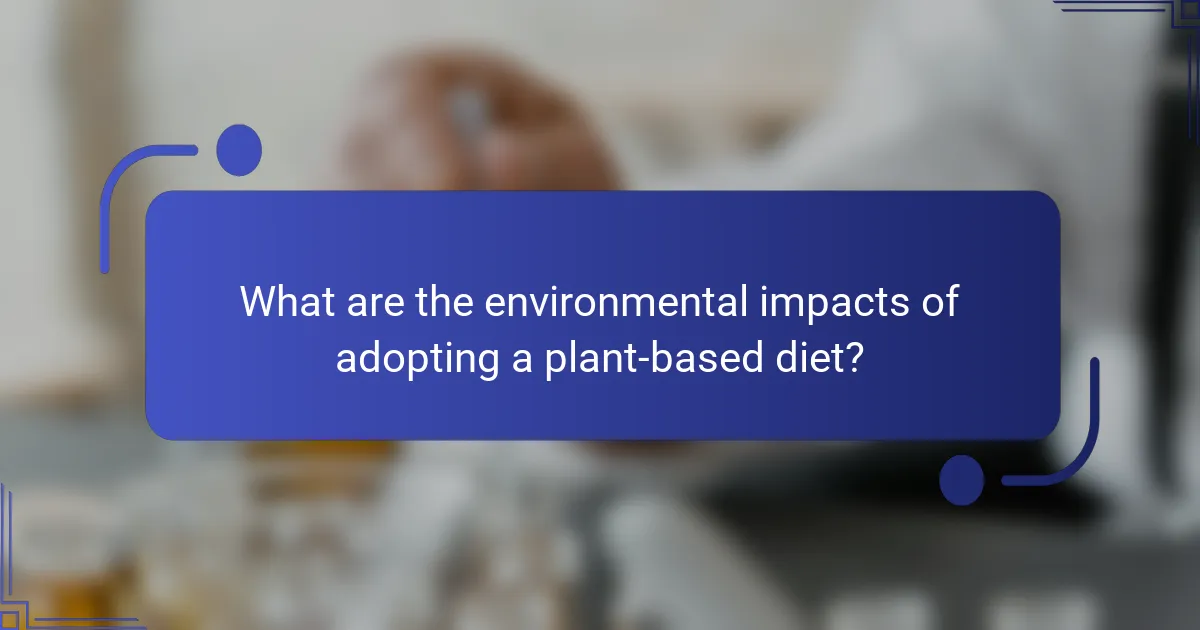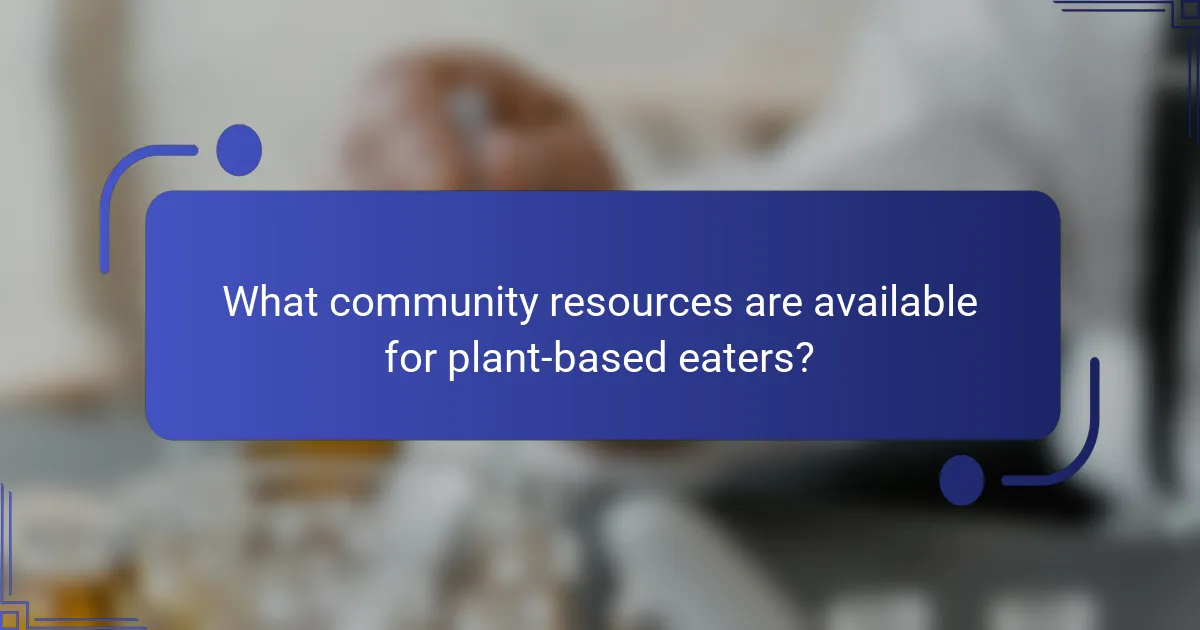A plant-based diet offers significant nutritional benefits, including lower cholesterol and improved heart health. This article explores essential recipes, community resources for support, and strategies for transitioning to a plant-based lifestyle. Discover how this diet can enhance overall wellness and contribute to environmental sustainability.

What are the key nutritional benefits of a plant-based diet?
A plant-based diet offers numerous nutritional benefits, including lower cholesterol levels, improved heart health, and enhanced weight management. It is rich in vitamins, minerals, and antioxidants, which support overall wellness. Studies show that plant-based diets can reduce the risk of chronic diseases such as diabetes and hypertension. Additionally, these diets provide essential nutrients like fiber, which aids digestion and promotes satiety.
How does a plant-based diet contribute to overall health?
A plant-based diet significantly enhances overall health by providing essential nutrients and reducing the risk of chronic diseases. This type of diet is rich in vitamins, minerals, and antioxidants, which support immune function and promote heart health. Studies indicate that individuals following a plant-based diet have lower cholesterol levels and reduced blood pressure. Additionally, the high fiber content aids digestion and helps maintain a healthy weight. Overall, adopting a plant-based diet can lead to improved well-being and longevity.
Which vitamins and minerals are abundant in plant-based foods?
Plant-based foods are rich in vitamins and minerals, including vitamin C, vitamin A, potassium, magnesium, and iron. These nutrients support overall health and well-being. For example, leafy greens provide high levels of vitamin K and folate, while legumes are excellent sources of iron and protein. Many fruits and vegetables also contain antioxidants, which help combat oxidative stress. Incorporating a variety of plant-based foods ensures a balanced intake of essential nutrients.
What role do antioxidants play in a plant-based diet?
Antioxidants play a crucial role in a plant-based diet by protecting cells from damage caused by free radicals. These compounds, found abundantly in fruits, vegetables, nuts, and seeds, contribute to reducing inflammation and lowering the risk of chronic diseases. Consuming a variety of antioxidant-rich foods enhances overall health and supports the immune system. Notably, unique antioxidants like flavonoids and carotenoids provide specific health benefits, such as improved heart health and better skin.

How can a plant-based diet support weight management?
A plant-based diet can effectively support weight management by promoting lower calorie intake and higher nutrient density. This diet is rich in fruits, vegetables, whole grains, and legumes, which provide essential vitamins and minerals while being lower in calories compared to animal products.
Research shows that individuals following a plant-based diet often experience improved satiety due to higher fiber content, which can lead to reduced overall food consumption. Additionally, plant-based diets are associated with a lower body mass index (BMI) and decreased risk of obesity-related diseases.
Incorporating diverse plant-based meals can also enhance adherence to this dietary approach, making it easier to maintain a healthy weight. Community resources, such as cooking classes and online forums, can provide support and inspiration for those transitioning to a plant-based lifestyle.
What are the effects of plant-based eating on metabolism?
Plant-based eating can enhance metabolism by improving nutrient absorption and promoting fat oxidation. A diet rich in fruits, vegetables, whole grains, and legumes provides essential nutrients that support metabolic processes. Studies indicate that plant-based diets may lead to lower body weight and improved insulin sensitivity, which are crucial for metabolic health. Additionally, the high fiber content in plant foods can aid in digestion and regulate blood sugar levels, further boosting metabolic efficiency.
Which plant-based foods are most effective for weight loss?
Plant-based foods effective for weight loss include leafy greens, legumes, whole grains, fruits, and nuts. These foods are low in calories and high in fiber, promoting satiety and reducing overall caloric intake.
Leafy greens like spinach and kale are nutrient-dense and low in calories. Legumes such as lentils and chickpeas provide protein and fiber, aiding in weight management. Whole grains, including quinoa and brown rice, offer sustained energy and fullness. Fruits like berries and apples are low in calories and high in water content, while nuts provide healthy fats that can curb hunger in moderation.
Incorporating these foods into meals can create a balanced diet that supports weight loss goals.

What are the environmental impacts of adopting a plant-based diet?
Adopting a plant-based diet significantly reduces environmental impacts. It lowers greenhouse gas emissions, conserves water, and minimizes land use compared to animal agriculture. For instance, plant-based diets can reduce carbon footprints by up to 50%. This shift also promotes biodiversity by decreasing habitat destruction associated with livestock farming. As a result, embracing plant-based eating contributes to a more sustainable future.
How does plant-based eating reduce carbon footprints?
Plant-based eating significantly reduces carbon footprints by lowering greenhouse gas emissions associated with animal agriculture. A plant-based diet typically requires less land, water, and energy, contributing to environmental sustainability. For example, producing plant-based foods generates fewer emissions compared to raising livestock. Transitioning to plant-based diets can reduce individual carbon footprints by up to 50%. This shift not only benefits personal health but also supports global efforts to combat climate change.
What are the water conservation benefits of plant-based diets?
A plant-based diet significantly enhances water conservation by reducing the water footprint associated with food production. For example, producing one pound of beef requires approximately 1,800 gallons of water, while one pound of vegetables needs only about 39 gallons. This stark difference underscores the efficiency of plant-based foods in conserving water resources. Adopting a plant-based diet can lead to a substantial decrease in water usage, promoting sustainability and environmental health.

Which popular recipes can enhance a plant-based diet?
Popular recipes that enhance a plant-based diet include chickpea salad, quinoa stir-fry, lentil soup, and vegetable curry. These dishes provide essential nutrients and flavors while promoting health.
Chickpea salad combines protein-rich chickpeas with fresh vegetables, offering fiber and vitamins. Quinoa stir-fry is a versatile dish packed with complete proteins and antioxidants. Lentil soup is rich in iron and folate, making it a hearty option. Vegetable curry, using various spices, enhances digestion and adds diverse nutrients.
Incorporating these recipes can improve overall nutrition and support a vibrant plant-based lifestyle.
What are easy plant-based breakfast ideas?
Easy plant-based breakfast ideas include smoothies, oatmeal, avocado toast, chia pudding, and fruit salads. These options are nutritious, quick to prepare, and packed with vitamins and minerals.
Smoothies can be made with spinach, bananas, and almond milk for a refreshing start. Oatmeal topped with berries and nuts provides fiber and energy. Avocado toast on whole-grain bread offers healthy fats and protein. Chia pudding, made with almond milk and sweetened with maple syrup, is rich in omega-3 fatty acids. Lastly, a fruit salad with seasonal fruits offers hydration and essential nutrients.
How can I prepare satisfying plant-based lunches?
To prepare satisfying plant-based lunches, focus on diverse ingredients and flavors. Incorporate whole grains, legumes, and colorful vegetables to enhance nutrition and taste.
Consider these ingredients for your lunches: quinoa, chickpeas, spinach, bell peppers, avocados, and nuts. These provide essential nutrients and healthy fats.
Experiment with different recipes, such as grain bowls, wraps, or salads, to keep meals exciting. For example, a quinoa bowl topped with roasted vegetables and tahini dressing offers a balanced meal rich in protein and fiber.
Utilize community resources like local farmers’ markets or plant-based cooking classes to discover new ingredients and cooking techniques. This enhances your culinary skills and connects you with others who share similar dietary interests.
What are some delicious plant-based dinner recipes?
Delicious plant-based dinner recipes include options like chickpea curry, quinoa-stuffed bell peppers, lentil soup, and vegetable stir-fry. These dishes are nutritious and satisfying, offering a variety of flavors and textures. For example, chickpea curry is rich in protein and fiber, while quinoa-stuffed peppers provide essential vitamins and minerals. Explore these recipes to enjoy the health benefits of a plant-based diet while satisfying your taste buds.

What community resources are available for plant-based eaters?
Plant-based eaters can access various community resources such as local meetups, online forums, and educational workshops. These resources foster connections and provide valuable information on nutrition, recipes, and lifestyle tips. Online platforms like social media groups and specialized websites offer recipe sharing and support networks. Local health food stores often host events that promote plant-based eating and provide opportunities for community engagement. Additionally, non-profit organizations focused on plant-based nutrition offer resources and guidance for those interested in adopting this lifestyle.
Which organizations support plant-based living?
Several organizations support plant-based living, promoting health, sustainability, and ethical eating. Notable examples include the Plant-Based Foods Association, which advocates for plant-based food products, and the Physicians Committee for Responsible Medicine, focusing on nutrition education. Additionally, the Vegan Society provides resources for those interested in vegan lifestyles, while the World Health Organization supports plant-based diets for health benefits. These organizations offer educational materials, recipes, and community support to foster plant-based living.
How can local farmers’ markets enhance plant-based diets?
Local farmers’ markets enhance plant-based diets by providing fresh, seasonal produce and fostering community connections. Access to diverse fruits and vegetables increases nutrient intake and encourages culinary creativity.
Shopping locally supports sustainable agriculture, reducing carbon footprints while promoting local economies. Farmers’ markets also offer educational resources, such as cooking demonstrations and nutrition workshops, which empower individuals to adopt healthier eating habits.
Engaging with local farmers fosters relationships that can lead to greater transparency about food sources, enhancing trust in food quality. As a result, individuals are more likely to incorporate plant-based foods into their diets.
What online forums are best for plant-based diet discussions?
Popular online forums for plant-based diet discussions include Reddit’s r/plantbased, Vegan Forum, and Plant-Based Diets on Facebook. These communities offer recipes, nutrition tips, and support for those embracing plant-based lifestyles. Reddit’s r/plantbased features over 300,000 members sharing experiences and advice. Vegan Forum provides a space for in-depth discussions on ethical, health, and environmental aspects of veganism. Facebook groups often focus on local recipes and events, fostering community connections.

How can I transition to a plant-based diet effectively?
Transitioning to a plant-based diet can be effective by gradually incorporating more plant foods while reducing animal products. Start by exploring diverse plant-based recipes that emphasize whole grains, legumes, fruits, and vegetables.
Consider meal prepping to ensure you have healthy options available. Join online communities or local groups for support and recipe sharing. Monitor your nutritional intake to ensure you meet protein, vitamin B12, and iron needs, which can be unique challenges in a plant-based diet.
What are the common challenges when switching to a plant-based diet?
Common challenges when switching to a plant-based diet include nutrient deficiencies, meal planning difficulties, social pressures, and taste preferences. Nutrient deficiencies can arise from a lack of vitamins B12 and D, iron, and omega-3 fatty acids. Meal planning may become overwhelming due to unfamiliar ingredients and recipes. Social situations can pose challenges when dining out or attending events. Additionally, adjusting to new flavors and textures can take time. Understanding these challenges can help individuals make a successful transition to a plant-based lifestyle.
Which strategies can ease the transition to plant-based eating?
Adopting a plant-based diet can be made easier with strategic approaches. Start by gradually incorporating plant-based meals into your routine. Explore diverse recipes to discover enjoyable options. Engage with a supportive community for motivation and tips. Meal prepping can streamline the transition, ensuring ready-to-eat plant-based dishes are available. Lastly, educate yourself on nutritional benefits to reinforce your commitment.
What are the best practices for meal planning on a plant-based diet?
Meal planning on a plant-based diet involves organizing meals to ensure balanced nutrition and variety. Start by incorporating a wide range of fruits, vegetables, whole grains, legumes, nuts, and seeds.
1. Identify nutritional needs: Focus on protein, iron, calcium, and vitamin B12.
2. Create a weekly menu: Plan diverse meals to avoid monotony.
3. Batch cook: Prepare meals in advance to save time.
4. Use seasonal produce: Maximize flavor and nutrition.
5. Experiment with recipes: Try new dishes to keep meals exciting.
6. Join a community: Engage with others for support and recipe ideas.
These practices enhance the plant-based experience and ensure nutritional adequacy.
What common mistakes should I avoid when starting a plant-based diet?
To succeed on a plant-based diet, avoid these common mistakes: neglecting protein sources, overlooking essential nutrients, relying too heavily on processed foods, and failing to plan meals. These pitfalls can hinder your dietary transition and overall health.
1. Neglecting protein sources: Ensure adequate intake from beans, lentils, and tofu.
2. Overlooking essential nutrients: Pay attention to vitamins B12, D, iron, and omega-3 fatty acids.
3. Relying too heavily on processed foods: Focus on whole foods for better nutrition.
4. Failing to plan meals: Prepare meals in advance to maintain a balanced diet.
By addressing these mistakes, you can enhance your plant-based diet experience and reap its full benefits.


